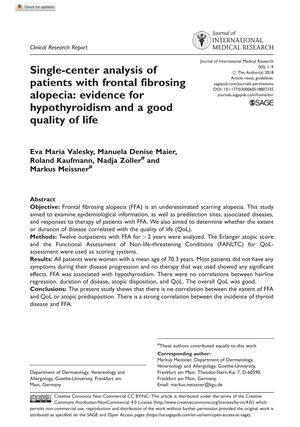Single-Center Analysis of Patients with Frontal Fibrosing Alopecia: Evidence for Hypothyroidism and a Good Quality of Life
October 2018
in “
Journal of international medical research
”

TLDR Frontal fibrosing alopecia is linked to hypothyroidism but doesn't affect quality of life.
This study analyzed 12 female outpatients with frontal fibrosing alopecia (FFA) over more than 2 years, with a mean age of 70.3 years. It found that FFA was associated with hypothyroidism, but there were no significant effects from any therapies used. Additionally, there was no correlation between hairline regression, disease duration, atopic disposition, and quality of life (QoL). Despite the disease, the overall QoL of the patients was good. The study concluded that the extent of FFA did not impact QoL or atopic predisposition, but there was a strong correlation between FFA and thyroid disease.











